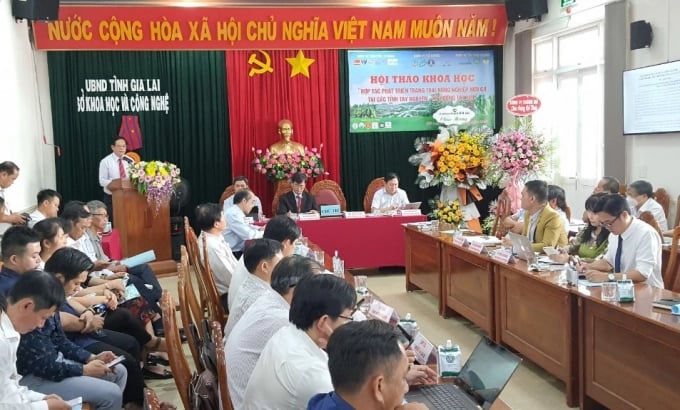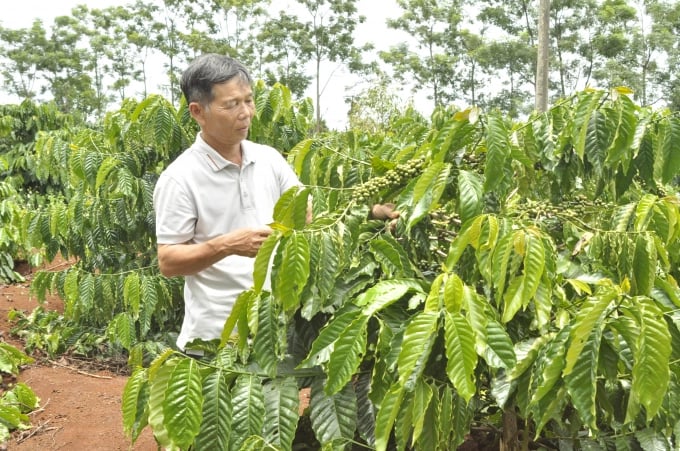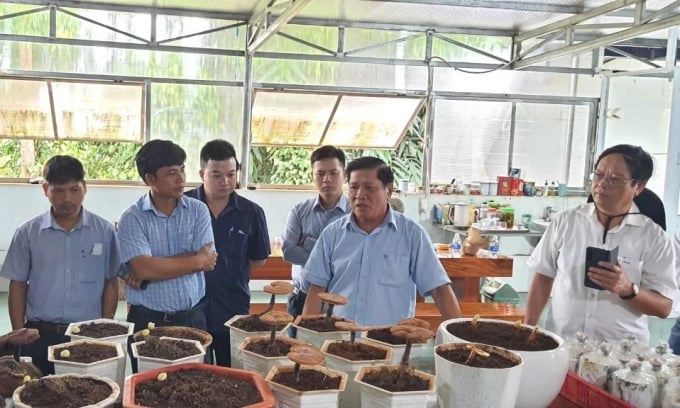June 21, 2025 | 00:59 GMT +7
June 21, 2025 | 00:59 GMT +7
Hotline: 0913.378.918
June 21, 2025 | 00:59 GMT +7
Hotline: 0913.378.918

Experts said that co-operation in the development of organic farming farms will help ensure more sustainable production. Photo: Tuan Anh.
The Vietnam Association of Farms and Agribusinesses on August 1 in collaboration with the Department of Science and Technology and the Department of Industry and Trade of Gia Lai province organised a scientific conference themed "Cooperation in organic agriculture farms in the Central Highlands provinces - an inevitable trend".
It is reported that the Central Highlands is gradually developing into a key agricultural commodity production area of the country with many key products. However, due to fragmented production, small scale, low productivity, weak linkage ability and modest application of high technology, agricultural development in the Central Highlands still faces risks and lacks sustainability.
The Central Highlands provinces in general and Gia Lai province in particular now need detailed plans, attract investment to build production linkage models to create sustainable material zones. Other solutions relates to product consumption, granting planting area codes, introduction, promotion and market connection.
Phung Thi Kim Hue from Institute of Health Research and Education Development of the Central Highlands, said that organic agriculture was very necessary to ensure the sustainability of the agricultural sector and economic development. However, to ensure this, there is still much work to be done such as transfer of technology, guide green agricultural practices to farmers.
Sharing the same view, Nguyen Dung, Vice Chairman of the Vietnam Farm and Agricultural Enterprises Association, said that a number of farms in Gia Lai and the Central Highlands have successfully conquered the European, American and Japanese markets with organic products that ensure safety for consumers. However, the majority of people in the Central Highlands provinces still produce fragmentedly in small-scale, low-yield production; their ability to link and apply high technology is still weak. Thus, the development of agriculture production faces risks and lacks of sustainability.
To develop agriculture quickly and effectively and make it an export industries, it was needed to concentrate on a large scale production, proactively responding to risks, with high international competitiveness, he said. Businesses, cooperatives and farmers need to build a supply chain from the raw material area associated with processing and consumption.
“Products need to have a brand, geographical indication, traceability, growing area code, certification of quality and food safety, protection of intellectual property. In addition, it is necessary to invite businesses with financial and technical capacity to organise production connection, high-tech application and joint investment in pre-processing and processing factories to improve quality, quantity and value of agricultural products”, Dung shared.
At the conference, participants also hado an opportunity to exchange and find partners, expand consumption markets, promote product brands and introduce new equipment for agricultural production according to the criteria of advanced agriculture like Australia, Japan, Korea, and New Zealand.
Earlier, the Vietnam Association of Farms and Agricultural Enterprises led the delegation to visit some models of organic agricultural farms in Gia Lai.

Coffee products of Phu's family are not enough to supply the market. Photo: Tuan Anh.
At the 13-hectare coffee garden of Nguyen Dinh Phu's family in Ho Lang village, Chu Pong commune, Chu Se district, the farm completely uses all manure and an economical watering system.
Phu said that each hectare of coffee the family earns from VND30 to 50 million higher than other gardens. Products are mainly sold to businesses in Nha Trang, Ho Chi Minh City, Ba Ria Vung Tau, Da Lat.
“Recently, a unit ordered 50 tonnes of green coffee, which we did not dare to accept because the area of the family was only enough to meet previous orders,” Phu said.
Phu added that ripe coffee is picked in batches, then washed, dried according to standards, then used a grain sorter. Coffee grade 1 supplied to the market costs from VND70,000 to 120,000 per kg, while type 2 costs VND55,000/kg. Thus, after deducting expenses, his family also earned about VND250 million per ha.
At a farm of VOS FIVE A Joint Stock Company in Dak Doa District, Gia Lai province, agricultural products such as durian, avocado, Ganoderma lucidum ... are exported with full identification codes for customers to check.

A product of VOS FIVE A company is exported to countries.
Tran Ngoc An, Chairman of the Board of Members of VOS FIVE A Joint Stock Company, said that with reishi products, we have been licensed by the US Food and Drug Administration to enter the market. Currently, this product is available in three countries with the most stringent requirements - the US, Japan, and India. In addition, the online e-commerce site Amazone has also signed a contract to distribute it. At the same time, we also cooperate with Dong Thap Domesco Company to produce nano ganoderma. Thus, it can be seen that the market is "thirst" for organic agricultural products.
Pham Van Binh, Director of Gia Lai Province's Department of Industry and Trade, said that in the near future, in order to find markets for organic products, all products that meet OCOP standards of Gia Lai province will be listed on the e-commerce floor. This will help Gia Lai connect to consumers across the country and create sustainable market for farmers who do organic farming.
Translated by Hien Anh
/2025/06/17/3942-2-143243_548.jpg)
(VAN) Recently, in Sweden, the Secretary of the Binh Dinh Provincial Party Committee presented the Investment Registration Certificate for the 'Polyester Fabric Recycling Complex' project to SYRE Impact-AB Company.
/2025/06/12/3721-2-202745_83.jpg)
(VAN) TH made an impression at Seoul Food 2025 with its line of natural beverages, paving the way for Vietnamese food products to enter the South Korean market.

(VAN) Soc Trang's success in rice exports stems from a strategy of developing fragrant and specialty rice cultivation areas and standardizing production toward low-emission practices.
/2025/06/11/1311-5-120811_839.jpg)
(VAN) The pig farming industry is facing the challenge of comprehensive restructuring to meet requirements for quality, safety, traceability, and market expansion both domestically and for export.

(VAN) Vietnam considers participating in ALGROALBA in order to expand agricultural production, coordinate the assessment and effective exploitation potential land.
/2025/06/05/5314-1-184727_407.jpg)
(VAN) From seemingly worthless fish scales and skin, enzymes and lactic ferments can transform by-products into peptides, opening a sustainable, effective business direction and elevating Vietnamese seafood.

(VAN) TTC AgriS and IFC signed a strategic partnership to develop a sustainable agricultural value chain, aiming to achieve the Net Zero target by 2035.